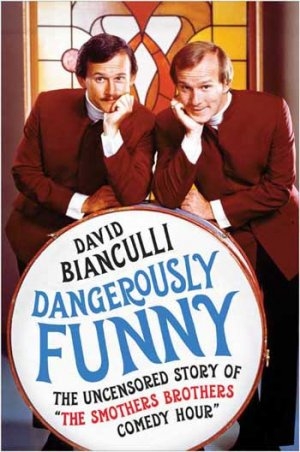From 1967 to 1969, Tommy and Dick Smothers challenged the censors at CBS and the political establishment who tried to tame their wildly popular — and politically left-leaning — show, The Smothers Brothers Comedy Hour. The brothers lost their show, but later won a battle in court. TV critic David Bianculli joins host Terry Gross to talk about the legendary comedy duo who tackled political issues and censorship.Based on extensive interviews with the Smothers Brothers and other key players, Bianculli describes the siblings’ lives both onscreen and behind the scenes in a new book, Dangerously Funny: The Uncensored Story of the Smothers Brothers Comedy Hour. Bianculli is a frequent contributor and guest host on Fresh Air. His previous books are Teleliteracy: Taking Television Seriously and Dictionary of Teleliteracy: Television’s 500 Biggest Hits, Misses, and Events. His website is www.tvworthwatching.com. Here’s an excerpt from Dangerously Funny:
However, by becoming unexpected martyrs to the cause of free speech, the Smothers Brothers lost their most influential national TV platform just when that freedom mattered the most. Like Elvis Presley when he was shipped off to the army, or Muhammad Ali when he was stripped of his heavyweight title for refusing to fight in Vietnam, the Smothers Brothers were nonconformist iconoclasts, pop-culture heroes yanked from the national spotlight in their prime. Muhammad Ali became the champ again, and Elvis returned to record many more number-one hits, but Tom and Dick Smothers never again enjoyed the influence or mass popularity of The Smothers Brothers Comedy Hour. In terms of introducing and encouraging new talent, pushing the boundaries of network television, and reflecting the youth movement and embracing its antiwar stance and anti-administration politics, the show was, quite literally, their finest Hour.
What, exactly, made the Smothers Brothers so important a guiding force in the 1960s? Mostly, they were in the right place at the right time, reacting to the ’60s as events unfurled around them. They were the first members of their generation with a prime-time pulpit, and they used it. Each season, the average age of their writing staff got younger, and the satiric edge of the material being televised — or censored — got sharper. Yet in an era when most families still watched television together, in the same room on the same TV set, the greatest and most impressive achievement of The Smothers Brothers Comedy Hour was that it spoke to and attracted young viewers without alienating older ones. With its humor, guest list, and high caliber of entertainment, it bridged the generation gap at a time when that gap was becoming a Grand Canyon-like chasm. MORE
[Video: George Harrison – Smothers Brothers TV Appearance 1968]

 FRESH AIR
FRESH AIR